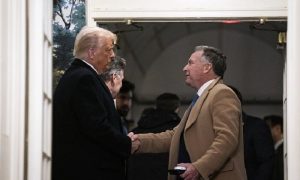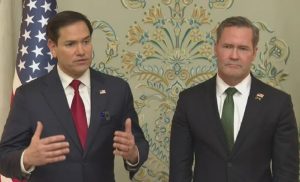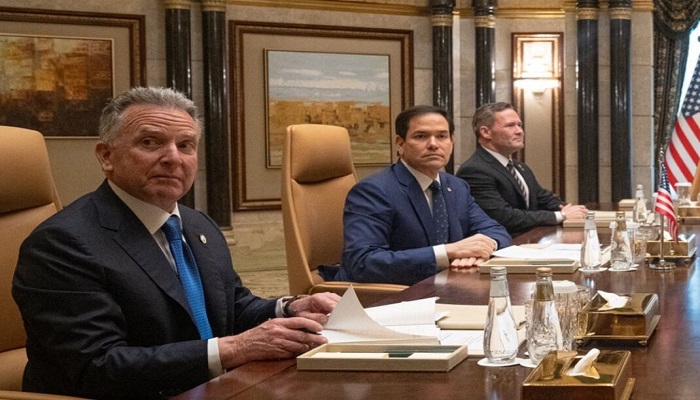PNN – Trump’s recent announcement regarding negotiations with Iran and the selection of Whitaker as America’s chief negotiator has significantly marginalized the positions of anti-Iranian warmongering figures in the White House.
Until just a few days ago, when the Islamic Republic of Iran complained to the UN Security Council about the United States’ threat to bomb if Tehran did not reach an agreement with Washington, many observers believed that the situation was completely in favor of the anti-Iranian current in the White House and that the negotiators were unable to stand up to the warmongers.
According to the report of Pakistan News Network, Donald Trump’s statements in his meeting with Benjamin Netanyahu have upset many of the calculations so far, especially those of the Israeli Prime Minister, who thought that in his meeting with Trump he could convince the US government to accept Libya’s nuclear disarmament plan for Iran.
Meanwhile, as Trump’s disagreement with Netanyahu, who insists on military action against Iran, becomes apparent, some Western media outlets are once again drawing attention to the division within the US government’s foreign policy team in dealing with Tehran.
The bipolarity of the confrontation with Iran among Trump’s entourage
Iran has always been a central issue in Donald Trump’s foreign policy. During his election campaign and afterwards, the US President criticized the Joe Biden administration’s approach towards Iran and emphasized the application of a “maximum pressure” policy by intensifying sanctions and confronting Iranian oil sales. At the same time, he reiterated the need to reach a nuclear agreement with Iran and avoid war, while also clarifying that he is not seeking regime change in Iran.

Meanwhile, the presence of a media figure like “Tucker Carlson” around the US President, who is said to have become an influential element in the White House, has added to the complexity of decision-making on Iran. In addition, names like “Eric Trump”, the third son of the US President, are mentioned by some sources as an influential advocate of resorting to diplomacy.
The front of diplomacy advocates at the core of American decision-making
According to some analysts, Steve Witkoff should be considered Trump’s main figure in any interaction and decision-making regarding Iran. He is the one who was preferred over “Keith Kellogg”, Trump’s special envoy for Ukraine, in negotiations with Russia to end the war in Ukraine, and instead of Kellogg, he took over the leadership of Washington’s negotiations with Moscow for a peace agreement in Ukraine.
In a recent interview, Witkoff called for a compromise with Iran on the nuclear issue and proposed a verification process to strictly monitor Iran’s nuclear activities. Referring to his positions, Agence France-Presse reported that Witkoff’s proposal is in line with Barack Obama’s 2015 agreement with Iran, which is also fully supported by European parties.
Tucker Carlson, who is known as a critic of American interventionism and is also said to have warned Trump against military conflict with Iran during his first term as president, is another figure who has influence over Trump on the issue of Iran. Carlson has warned Trump against any military action against Iran, saying that attacking Iran would certainly lead to a war that would cost billions of dollars and result in the deaths of thousands of Americans in the region.
The Trump Cabinet’s Warmongers Struggle against Iran
But that’s not all. On the other side of the White House security table are hardliners known as the hawks and interventionists. They believe that the only way to stop Iran’s nuclear program is through military action or a credible threat of war, or to completely dismantle Iran’s nuclear program through military action as well as political pressure.
Mike Waltz, who heads the White House security team, is a key figure in this group. Waltz recently said in an interview with NBC News that all options are on the table and that he does not rule out using military force against Iran. In further statements, he has even called for a definitive end to Iran’s missile and weapons programs and the abandonment of its enrichment cycle. Waltz went on to tell NBC News that the Iranians can either hand these over and abandon them in a verifiable manner or face a series of other consequences.

US Secretary of State Marco Rubio is another figure who could be decisive in the White House’s final decisions regarding Iran. Rubio’s positions on Iran are no secret. Since he was elected as a senator, he has always had sharp and harsh positions against the Islamic Republic of Iran; although in the executive position the story is completely different, his intellectual background is the same as his previous positions.
Like Waltz, Rubio calls for the complete dismantling of Iran’s nuclear program and recently claimed in an interview in response to the possibility of an assassination attempt on Trump by Iran that the United States has the ability to change the Iranian regime. Rubio was also a staunch opponent of the Iran nuclear deal.
Which group determines the final White House policy?
Given the rift among the US government’s security advisors, making a decision does not seem to be that simple for the US President. According to some observers and analysts, Donald Trump’s positions over the past months indicate a kind of confusion and doubt regarding the issue of Iran.
American Enterprise wrote in a report titled “Trump’s Advisers Are at odds over Iran” that the US President is personally undecided between these two views. On the one hand, he continues to identify Iran as the main enemy, but on the other hand, he has no desire to enter into a new war and prefers to reach an agreement with Iran, however public, that he can present as a victory, even if in practice it is more limited than Obama’s agreement.
However, the report does not rule out that the winner of the White House debate may determine the Trump administration’s final policy toward Iran. Matthew Continetti, the author of the report and an analyst for the Free Press, says that Trump’s policy toward Iran in his second term may be shaped by the balance of power within his team, rather than by a clear, unified strategy. He is simultaneously fascinated by displays of power and deeply averse to military spending and war.

